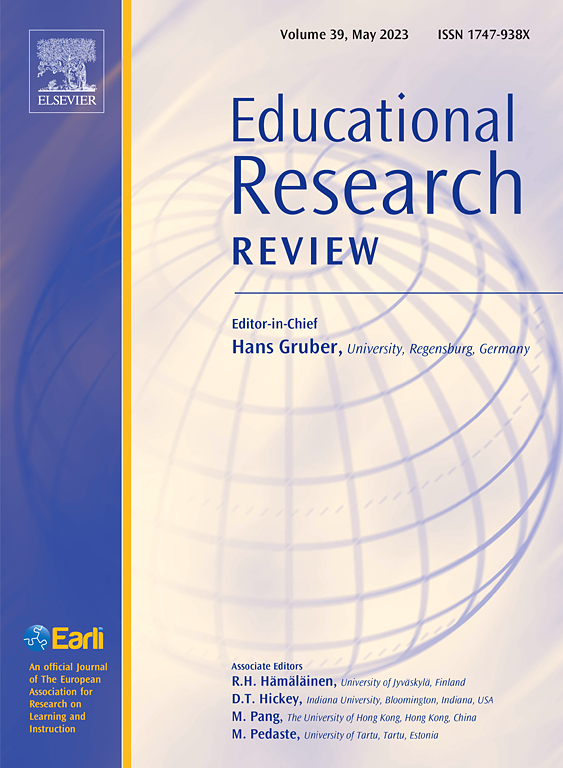A meta-analysis of the correlation between teacher self-efficacy and teacher resilience: Concerted growth and contextual variance
IF 10.6
1区 教育学
Q1 EDUCATION & EDUCATIONAL RESEARCH
引用次数: 0
Abstract
The relationship between teacher self-efficacy (TSE) and teacher resilience (TR) is a bourgeoning area of study in teacher education research. This meta-analysis is the first of its kind to synthesise ‘fragmented’ quantitative evidence on the correlation between the two constructs. Following the Preferred Reporting Items for Systematic Reviews and Meta-Analyses (PRISMA) guidelines, a total of 21 studies were included in the meta-analysis, encompassing a sample of 6022 pre-service and in-service teachers across different national settings. The random-effects model yielded a statistically significant, positive, moderate correlation between TSE and TR (r = .49). Follow-up subgroup meta-analysis revealed the variability in the effect sizes between studies conducted in Asia, Europe, the Caribbean, and North America. No statistically significant variability in the effect sizes was found between pre-service and in-service teacher samples or between studies using different measures of resilience and self-efficacy. This meta-analysis provides insights into fostering the ‘concerted growth’ in TSE and TR through initial teacher education and ongoing professional development. These insights offer a productive response to the challenging teaching profession.
教师自我效能感与教师复原力之间相关性的元分析:协同成长与环境差异
教师自我效能感(TSE)与教师抗挫折能力(TR)之间的关系是教师教育研究中一个蓬勃发展的研究领域。本荟萃分析首次综合了有关这两个概念之间相关性的 "零散 "定量证据。根据系统综述和荟萃分析首选报告项目(PRISMA)指南,共有 21 项研究被纳入荟萃分析,涵盖了 6022 名不同国家背景下的职前和在职教师样本。随机效应模型显示,TSE 与 TR 之间存在显著的正相关性(r = 0.49)。后续的分组荟萃分析显示,在亚洲、欧洲、加勒比海地区和北美洲进行的研究之间的效应大小存在差异。在职前和在职教师样本之间,以及使用不同抗逆力和自我效能测量方法的研究之间,均未发现有统计学意义的效应大小差异。这项荟萃分析为通过初始教师教育和持续的专业发展来促进 TSE 和 TR 的 "协同增 长 "提供了启示。这些见解为应对教师职业的挑战提供了富有成效的对策。
本文章由计算机程序翻译,如有差异,请以英文原文为准。
求助全文
约1分钟内获得全文
求助全文
来源期刊

Educational Research Review
EDUCATION & EDUCATIONAL RESEARCH-
CiteScore
19.40
自引率
0.90%
发文量
53
审稿时长
57 days
期刊介绍:
Educational Research Review is an international journal catering to researchers and diverse agencies keen on reviewing studies and theoretical papers in education at any level. The journal welcomes high-quality articles that address educational research problems through a review approach, encompassing thematic or methodological reviews and meta-analyses. With an inclusive scope, the journal does not limit itself to any specific age range and invites articles across various settings where learning and education take place, such as schools, corporate training, and both formal and informal educational environments.
 求助内容:
求助内容: 应助结果提醒方式:
应助结果提醒方式:


